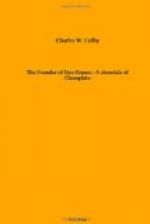This difference of temperament and outlook, which is so plainly reflected on the printed page, also had its effect upon the personal relations of the two men. It was not that Lescarbot scandalized Champlain by his religious views, for though liberal-minded, Lescarbot was not a heretic, and Champlain knew how to live harmoniously even with Huguenots. The cause of the coolness which came to exist between them must be sought rather in fundamental contrasts of character. To Champlain, Lescarbot doubtless seemed a mere hanger-on or protege of Poutrincourt, with undue levity of disposition and a needless flow of conversation. To Lescarbot, Champlain may well have seemed deficient in literary attainments, and so preoccupied with the concerns of geography as to be an uncongenial companion. To whatever cause conjecture may trace it, they did not become friends, although such lack of sympathy as existed shows itself only in an occasional pin-prick, traceable particularly in the later editions of their writings. For us it is the more needful to lay stress upon the merits of Lescarbot, because he tends to be eclipsed by the greater reputation of Champlain, and also because his style is sometimes so diffuse as to create prejudice. But at his best he is admirable, and without him we should know much less than we do about that Acadian experience which holds such a striking place in the career of Champlain.
The popular estimate of French character dwells overmuch upon the levity or gaiety which undoubtedly marks the Gallic race. France could not have accomplished her great work for the world without stability of purpose and seriousness of mood. Nowhere in French biography are these qualities more plainly illustrated than by the acts of Champlain. The doggedness with which he clung to his patriotic and unselfish task is the most conspicuous fact in his life. Coupled therewith is his fortitude, both physical and moral. In times of crisis the conscript sets his teeth and dies without a murmur. But Champlain enlisted as a volunteer for a campaign which was to go on unceasingly till his last day. How incessant were its dangers can be made out in full detail from the text of the Voyages. We may omit the perils of the North Atlantic, though what they were can be seen from Champlain’s description of his outward voyage in the spring of 1611. The remaining dangers will suffice. Scurvy, which often claimed a death-roll of from forty to eighty per cent in a single winter; famine such as that which followed the failure of ships from home to arrive at the opening of navigation; the storms which drove the frail shallop on the rocks and shoals of Norumbega; the risk of mutiny; the chances of war, whether against the Indians or the English; the rapids of the wilderness as they threatened the overloaded canoe on its swift descent; the possible treachery of Indian guides—such is a partial catalogue of the death-snares which surrounded the pathway of an explorer like Champlain. Every one of these dangers is brought before us by his own narrative in a manner which does credit to his modesty no less than to his fortitude. Without embellishment or self-glorification, he recites in a few lines hairbreadth escapes which a writer of less steadfast soul would have amplified into a thrilling tale of heroism. None the less, to the discriminating reader Champlain’s Voyages are an Odyssey.




